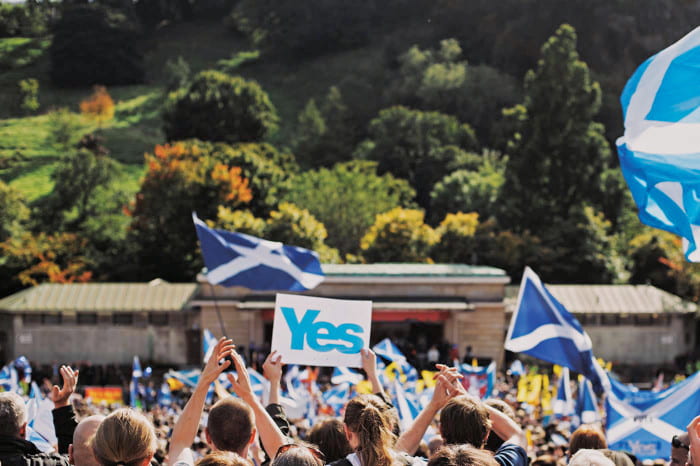By MARY BURGER – STAFF WRITER
The day of Sept. 18 was a significant moment in Scottish/English history. It was the long awaited day of the Scottish Independence referendum; the day the world learned if Scotland would become an independent nation or remain part of the United Kingdom. The 84.6 percent of voter turnout resulted in a close victory for the “No” side, netting 55.3 percent of the vote.
Chair of the History Program Dr. Amos Tubb cited three events that prompted this referendum vote. The first was the 1979 election of Conservative Margaret Thatcher as Prime Minister.
Thatcher and the Conservative party wanted to create a more sustainable economy, which would no longer depend on aspects central to Scotland, like coalmining and shipbuilding. The closing of these businesses led to unemployment and communal decimation in Scotland.
A second reason involves the aristocracy. Historically, Conservatives were aristocrats who hailed from Scotland. Although they did not ideologically align with Scotland, they had land and ancestral connections there.
Margret Thatcher, however, was a middleclass Englishwoman with no ancestral ties to Scotland. Due to these reasons, the Conservative party lost connection with the predominately Labour Party-supporting Scotland.
A third reason revolves around the British Parliamentary system. One must begin by looking at the way the British Parliament system is set up.
The political party determines which candidate runs for which seat. The British Labour Party picked the best candidates in Scotland to run for positions in the National Parliament in London, leaving few to no qualified candidates to run for the Scottish Parliament (which functions much in the same way as our local state governments due).
In the 2011 Scottish Parliament election, a vote resulted in a secondary party, the Scottish National Party (SNP) winning the majority and therefore becoming the governing party. The main platform of the SNP was independence.
While the referendum vote ultimately came to a “No,” Scotland will receive more benefits than it did previously.
“What [British Prime Minister David Cameron] was offering the Scots was more of a Federal system that we have in the U.S. Britain’s government is one of the most centrally controlled governments in the Western world. Their central government controls almost everything that our national and state governments control,” Dr. Tubb said.
Scotland received the opportunity to have its own Parliament in the late 1990s. This means that Scotland received money to spend on internal things like education. Now, Cameron is taking that further so that Scotland will be able to control almost everything that a United States state government controls.
Parliament in London will only control defense, trade, and currency. Cameron recently adapted his promise by stating that he will grant Scotland these rights if they are given to Wales and Northern Ireland as well.
While hypothetical, conversations regarding the referendum often turned to Scotland’s outcome if the country voted “Yes” for independence.
This debate was heavily spurred on by the fact that an independent Scotland may have lost its currency of the British pound.
Regardless of one’s opinion of the referendum, the opportunity to witness it was a once in a lifetime opportunity. Junior Amanda Vokoun saw this historical moment first-hand while studying in Glasgow.
“Being in Scotland during such a pinnacle time was incredible. I am usually one who does not get excited over political events, but the energy from the ‘yes’ campaign was hard to resist,” Vokoun said.
There was quite a bit of excitement and frenzy in the few days before the vote.
“For all of the days leading up to voting day, there were rallies, debates, and people in the streets giving out flyers with information on the issue…Unlike most of Scotland where the vote was almost equally tied, Glasgow heavily supported independence,” Vokoun said.
“Although I couldn’t vote, on Sept. 18 I wore a hat that said ‘yes’ on it to support Scotland’s possible future of new freedom and new beginnings. After the polls closed that day, there was a huge rally that congregated in St. George’s square. Everyone went crazy, and many stayed up all night to hear the results. There were people playing bagpipes, holding Scottish flags, and there was even a man who climbed up on one of the statues. I was so thankful I got to experience firsthand this once-in-a-life time opportunity.”
